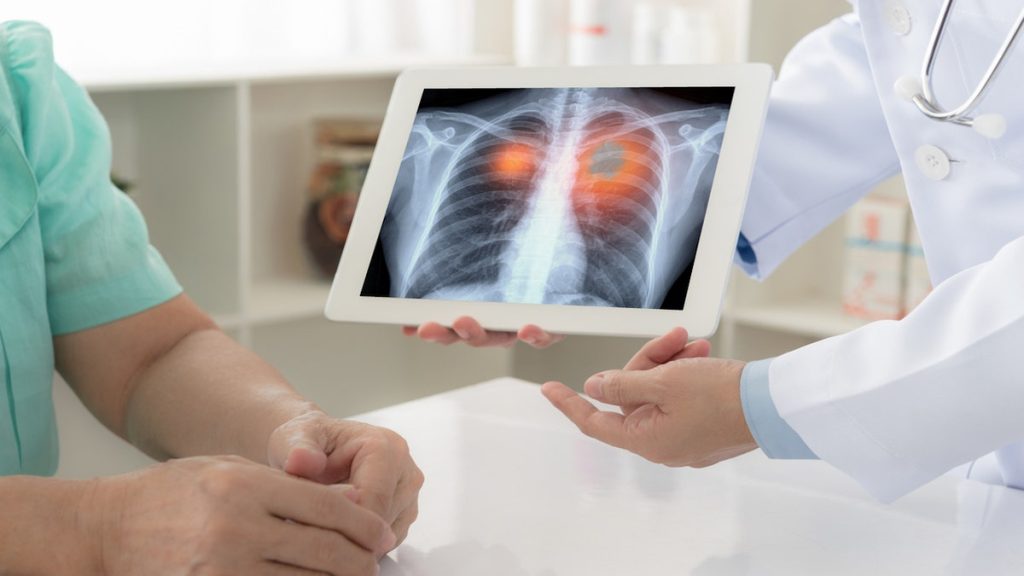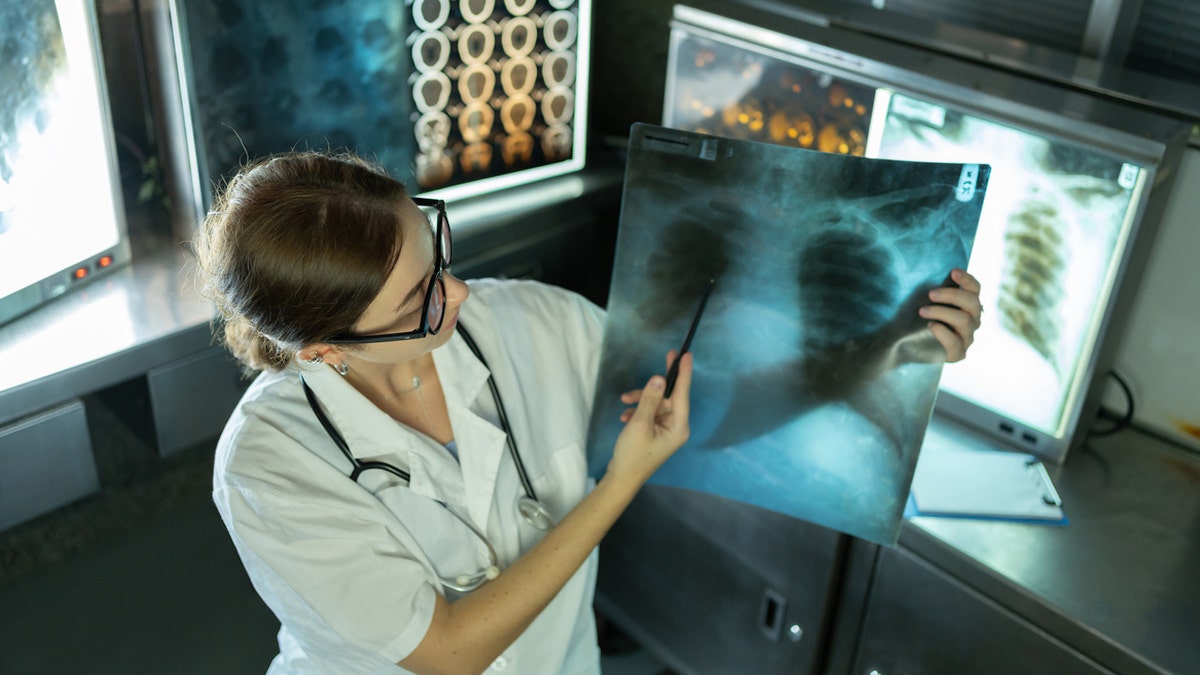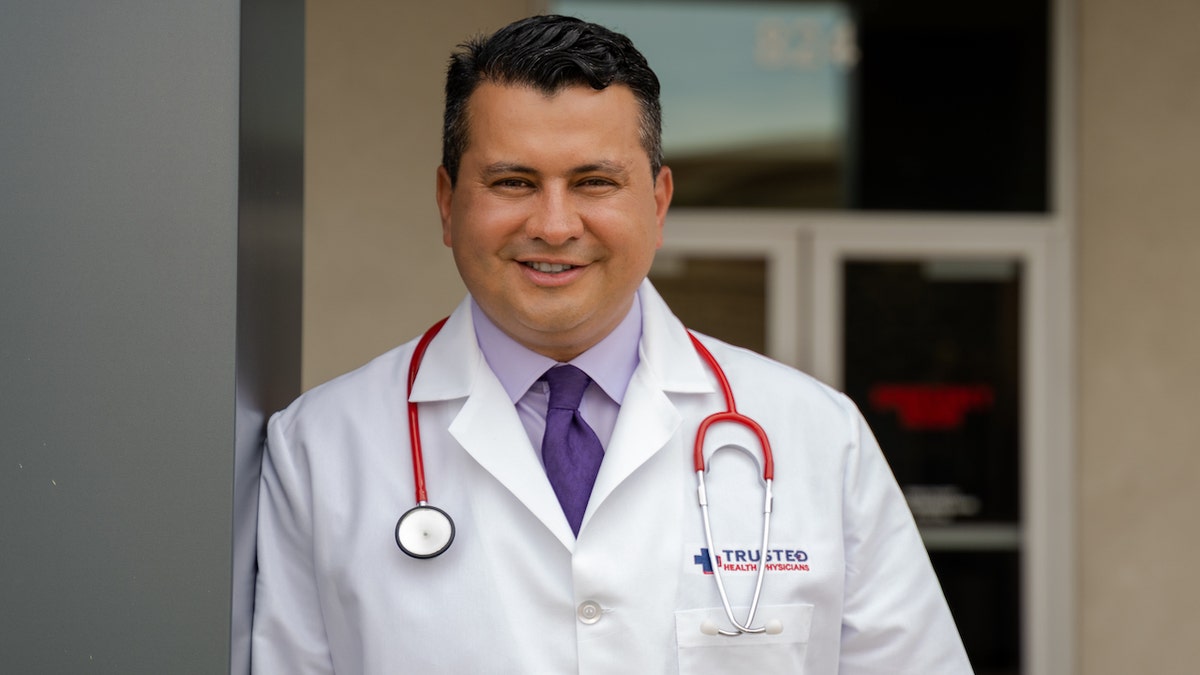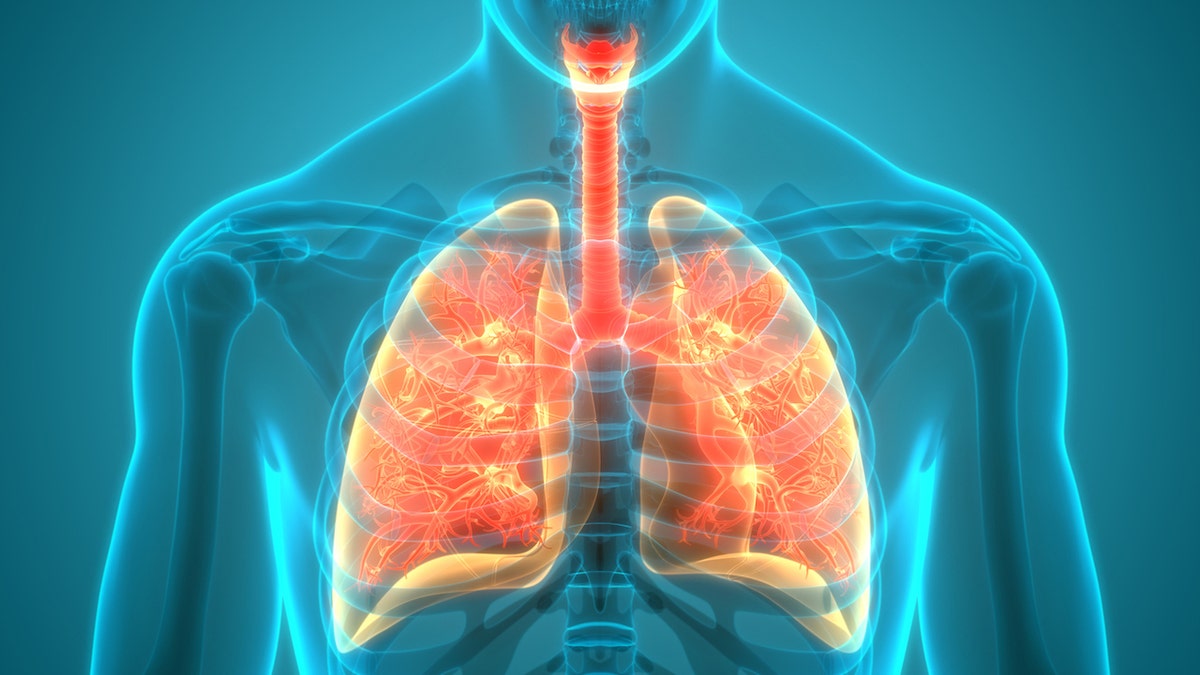
Among the latest artificial intelligence innovations in health care, a routine chest X-ray could help identify non-smokers who are at a high risk for lung cancer.
The study findings will be presented this week at the annual meeting of the Radiological Society of North America (RSNA) in Chicago.
Researchers from the Cardiovascular Imaging Research Center (CIRC) at Massachusetts General Hospital (MGH) and Harvard Medical School in Boston developed a deep learning AI model using 147,497 chest X-rays of asymptomatic smokers and never-smokers.
WHAT IS ARTIFICIAL INTELLIGENCE?
The model “learned” to recognize patterns associated with lung disease in the X-ray images.
Next, the researchers applied the AI model to a total of 17,407 patients, with an average age of 63 years old.

A routine chest X-ray could help identify non-smokers who are at a high risk for lung cancer, a study found. (iStock)
Of the 28% of patients flagged as high risk by the AI model, 2.9% of them were later diagnosed with lung cancer within the next six years.
That was more than twice the share of the patients in the low-risk group who ultimately were diagnosed.
LUNG CANCER PILL SHOWS ‘EARTH-SHATTERING’ RESULTS IN 5-YEAR STUDY: ‘AN OPTIMISTIC TIME’
“The AI tool could identify non-smokers at a high risk of developing lung cancer over the next six years,” said senior author Michael T. Lu, M.D., director of artificial intelligence and co-director of CIRC at MGH, in an email to Fox News Digital.
“The AI accomplished this by ‘looking’ at existing chest X-ray images obtained for cough, fever or other routine indications.”

Researchers developed a deep learning AI model using 147,497 chest X-rays of 40,643 asymptomatic smokers and never-smokers. (iStock)
Chest X-rays are one of the most common medical tests, Lu noted.
“The underlying idea is that there is information on the chest X-ray about the individual’s health and risk of cancer that we currently don’t use, but can be extracted from the image using AI,” he said.
“This is a way to get more value out of existing chest X-rays, and for patients to make more personalized decisions about their health.”
LUNG CANCER: TYPES, SYMPTOMS AND TREATMENT OPTIONS
The study findings could help open up new detection opportunities for non-smokers, who tend to fall between the cracks when it comes to screening for this disease.
“Lung cancer is increasingly common in non-smokers, but currently we have very limited tools to tell who is at risk of lung cancer and who could benefit from further tests like lung cancer screening chest CT scans,” Lu said.
“Since cigarette smoking rates are declining, approaches to detect[ing] lung cancer early in those who do not smoke are going to be increasingly important,” he added.

There is no recommended lung screening for people who have never smoked or have only smoked very little. (iStock)
Current guidelines from the United States Preventive Services Task Force (USPSTF) and Medicare recommend lung cancer screenings for adults between the ages of 50 and 80 who have at least a 20-pack-year smoking history and who currently smoke or have quit within the past 15 years.
There is no recommended screening for people who have never smoked or have only smoked very little.
“However, lung cancer is increasingly common in never-smokers and often presents at an advanced stage,” said the study’s lead author, Anika S. Walia, a medical student at Boston University School of Medicine and researcher at CIRC, in a statement.
ARTIFICIAL INTELLIGENCE HELPS DOCTORS PREDICT PATIENTS’ RISK OF DYING, STUDY FINDS: ‘SENSE OF URGENCY’
The main limitation of the study is that it was retrospective, meaning the researchers looked at people who had chest X-rays in the past.
“This was necessary to be able to know who was later diagnosed with lung cancer in the six years after the chest X-ray,” Lu noted.

An AI expert noted that the model’s use of routine chest X-rays makes it a “potentially accessible and cost-effective tool for early detection.” (iStock)
Looking ahead, the study authors said that a clinical trial is necessary to determine whether high-risk people identified by the AI tool would benefit from further tests.
“Lung cancer screening CT is much more accurate than chest X-ray for detecting lung cancer, but it is not feasible or desirable for all non-smokers to get” a CT scan, Lu said.
NEW AI TECH AIMS TO DETECT THE ORIGIN OF CANCERS FOR OPTIMAL TREATMENTS: ‘AN IMPORTANT STEP’
“This AI tool could help identify the non-smokers at the highest risk who are most likely to benefit from CT.”
Dr. Harvey Castro, a Dallas, Texas-based board-certified emergency medicine physician and national speaker on artificial intelligence in health care, was not involved in the study but offered his input on the findings.

Dr. Harvey Castro, a Dallas, Texas-based board-certified emergency medicine physician and national speaker on artificial intelligence in health care, offered his input on the new findings. (Dr. Harvey Castro)
“The use of AI to predict lung cancer risk in never-smokers is a significant advancement,” he told Fox News Digital in an email.
“It addresses a gap in current screening guidelines, which primarily focus on individuals with a history of smoking.”
He noted that the model’s use of routine chest X-rays makes it a “potentially accessible and cost-effective tool for early detection.”
“Around 10% to 20% of lung cancers occur in people who have never smoked cigarettes or have smoked fewer than 100 total cigarettes.”
The fact that the AI model was developed and validated using a large dataset adds credibility to its predictive power, Castro added.
The expert pointed out some caveats, however.
“There is a potential risk of overdiagnosis and overtreatment,” he said.
CLICK HERE TO SIGN UP FOR OUR HEALTH NEWSLETTER
The potential for ethical and privacy concerns could also be a concern, Castro noted.
“The use of AI in health care raises questions about data privacy and the ethical implications of algorithm-based decision-making,” he said.
Castro also called for the study to be replicated in diverse populations to ensure that it applies across different demographic groups.

Lung cancer is the leading cause of cancer death, with around 238,340 new cases and 127,070 deaths expected in the U.S. this year, according to the American Cancer Society. (iStock)
“Longer-term studies beyond six years would also be beneficial to understand the full implications of using this AI tool.”
Overall, Castro said the study presents a “promising tool” for lung cancer screening in never-smokers, but that it requires careful consideration of its potential risks and limitations.
“As an ER physician interested in AI and health care, such insights are crucial for evaluating the practical and ethical implications of integrating AI into clinical practice,” he said.
CLICK HERE TO GET THE FOX NEWS APP
Lung cancer is the leading cause of cancer death, with around 238,340 new cases and 127,070 deaths expected in the U.S. this year, according to the American Cancer Society.
Around 10% to 20% of lung cancers occur in people who have never smoked cigarettes or have smoked fewer than 100 total cigarettes in their lives.
For more Health articles, visit www.foxnews.com/health.

 Latest Breaking News Online News Portal
Latest Breaking News Online News Portal




